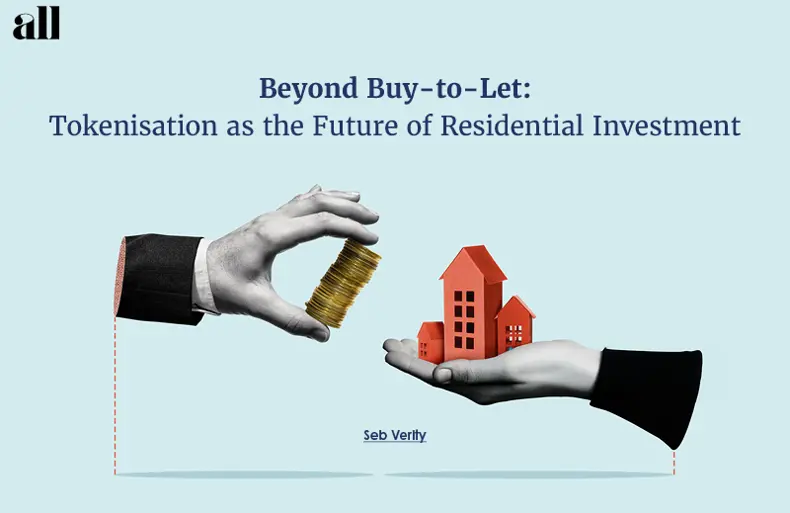Blog | Residential Investment | Valuation
Beyond Buy-to-Let: Tokenisation as the Future of Residential Investment

Real estate tokenisation could fundamentally revolutionise property investment across the United Kingdom, by transforming how retail investors (Non-professional, private individual investors) access and participate in property markets.
This innovative application of conventional blockchain technology is already becoming reality:
- Dubai development giant DAMAC signed a $1bn deal in January 2025 with blockchain platform MANTRA to tokenise assets across the Middle East.
- In 2022, Knight Dragon announced plans to tokenise the economic interests of a 191 unit building in their massive Greenwich peninsula regeneration project.
- As recently as May this year, the Dubai Land Department (DLD) launched the region’s first tokenized real estate investment project through a ‘Prypco Mint’ platform enabling fractional investment in emerging real estate projects for as little as AED2,000.
This ‘crowdfunding’ approach to real estate investment represents a paradigm shift in how we assess development viability, challenges the future of investment models and promises to democratise property ownership. Through blockchain technology, properties can now be divided into digital tokens, enabling fractional ownership and creating unprecedented opportunities for both institutional and retail investors.
The benefits of tokenisation are potentially transformative for the property sector. Fractional ownership allows smaller investors to access high-value assets that were previously beyond their reach, breaking down traditional barriers to entry, while at the same time not imposing asset management burdens on those individuals.
Increased liquidity through secondary markets will enable investors to trade their property tokens more efficiently than conventional property transactions. Global accessibility expands the investor base internationally, whilst blockchain transparency provides immutable records of ownership and transactions, increasing trust through enhanced KYC & AML compliance.
The lure of increased asset liquidity – traditionally real estate’s Achilles heel – by expanding the investor pool and reducing the entry threshold, as well as opening up ‘near-instant’ secondary markets for trading assets, is an obvious one. However, a different liquidity barrier has until now presented a significant challenge for real estate tokenisation: the difficulty of converting digital tokens into fiat currency.
This problem stems from cryptocurrency’s volatility and the regulatory uncertainty surrounding existing digital assets. Such legal and conceptual barriers have hindered widespread adoption amongst traditional investors who require both stable, predictable returns AND reliable exit strategies. Confidence in the handful of crypto exchanges which offer to ‘off-ramp’ from the digital world into ‘real money’ have been undermined by the collapse of high-profile businesses like FTX in 2023 and Mt Gox in 2014, as well as the on-going non-compliance with FCA regulation by Binance and other popular exchanges.
Yet there is now light at the end of this tunnel with the emergence of the Bank of England’s Digital Pound project and new, FCA-compliant approaches to stablecoins. In May this year, the FCA issued a Stablecoin issuance and cryptoasset custody consultation - a suite of new rules to ensure that regulated stablecoins maintain their value and have clear information on how the backing assets are being managed, alongside new guidance governing qualifying stablecoin issuers; all part of the FCA’s emerging roadmap for crypto regulation.
As a result, new, FCA-regulated bridges from the digital world to the real world are emerging:
- This June BCP Technologies launched a new ERC-20 GBP stablecoin aka ‘tGBP’ on the Ethereum network which is backed 1:1 by reserves held in a segregated account at a UK-regulated financial institution and is fully redeemable for sterling at any time.
- In 2024, the Babb Group launched ‘Onchain Money’ on their own ReDeFi blockchain in partnership with Clearbank. Rather than maintain an ERM-style 1:1 peg between real & digital money, their DeFi product ‘shadows’ the movement of cryptocurrencies on chain by directly mirroring EUR & GBP funds in traditional, retail bank accounts without necessitating token issuance.
While blockchain solutions address the digital side of democratisation, parallel developments in traditional markets are emerging. The recent launch of Aram on the Aquis Stock Exchange represents another approach to broadening investment in UK real estate. Backed by industry figures including Australian Rugby World Cup winner Michael Lynagh, it aims to create a liquid marketplace for real asset securitisation, providing a conventional solution to the fact that only 5% of UK commercial real estate (~£65 billion) is currently listed and directly accessible via a tradable marketplace.
But novel Real Estate stock exchange mechanisms have been tried before, with Mailbox REIT’s IPO on the International Property Securities Exchange (IPSX) perhaps the most high-profile example. The IPSX enabled the listing of a single commercial property via an IPO of their propco, provided the asset was in a single geographic location and was of institutional grade. Shareholders could then invest in the building as opposed to a company, with the aim overall being to democratise property investment and enable city-level or asset-specific direct investment, rather than pooling funds into a wider REIT portfolio. However, the IPSX wound itself up in Q3 2023 citing a “perfect storm of macro headwinds” which had left it “unable to scale the platform” at a rate which would have made their investment model successful.
It may be therefore that the residential living sectors represent the best use case for tokenisation, particularly given current UK rental market challenges. Buy-to-let landlords are increasingly exiting the market due to increased costs and administrative burdens, creating a reduction in rental supply.
It may be therefore that the residential living sectors represent the best use case for tokenisation, particularly given current UK rental market challenges. Buy-to-let landlords are increasingly exiting the market due to increased costs and administrative burdens, creating a reduction in rental supply.
This exodus has created significant supply-side challenges for the Private Rented Sector, reducing available housing stock and impacting rental affordability. Build-to-Rent is clearly part of the solution, as are specialist sector offerings like retirement housing, student housing (PBSA & HMOs) and co-living. However, the scale of the investment required to renew, replace and/or augment the country’s rental stock is huge – far more than institutional investment can arguably, safely fund.
In which case, tokenised residential real estate presents a compelling solution, enabling small retail investors – not least the growing number of former buy-to-let landlords - to reinvest in professionally managed PRS housing on terms which may help deliver more affordable rental accommodation than the financial models currently used by institutions.
- Traditional Build-to-Rent developments typically focus on prime product, commanding upper quartile rents due to high construction costs, extensive amenity provision, and the higher ROI returns demanded by institutional investment models.
- In contrast, crypto-crowdfunded rental investment from individual retail investors would likely operate with lower return expectations and focus on smaller, more modest schemes.
This fundamental difference in investment approach could enable significantly lower rents to be charged whilst maintaining professional standards of management.
The Bank of England’s digital Pound project is now in its Design Phase, with progress to the Implementation Phase likely as early as 2027. Mass crypto-crowdfunded investment in real estate may not be as far-away or be as fanciful as it may currently sound…
Related Insights

Owning an HMO Property: Weighing the Pros and Cons
Houses in Multiple Occupation (HMOs) have become a popular investment strategy for landlords seeking higher yields and divers...

Northern Residential Investment & Development Transactions 2025
2025 was a record year for our team in Leeds, with 24 transactions completed and at least one deal successfully concluded in ...

Allsop sells Hadrian’s Tower, Newcastle’s tallest residential building
On 20th June 2025, L1 Capital acquired Hadrian’s Tower, a landmark 27-storey residential building in Newcastle city centre, i...

Allsop completes major residential investment acquisition in Leeds for HNW overseas client
Allsop has acquired Headingley Park in Leeds for a price in the region of £30M on behalf of a private overseas client.